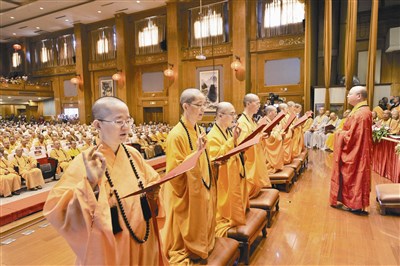
Fostering Executive Power
Fostering Executive Power The ability to get things done and accomplish one’s vision is the secret that can bring success to any organization or enterprise.
Even during the Buddha’s time the monastic community had a well-developed organizational system. The Buddha set up the posadha system, in which monastics met regularly to reflect upon their religious lives and confess their faults, and the karman system for conducting meetings and adopting resolutions. In these systems we can see a set of legal procedures that are even more complete in their details than those of many modem countries. The Buddha’s management style reflects a deep understanding of human nature and his system of rules and regulations are skillfully adaptive. The Buddha’s monastic community could be ranked among the best of the many successful enterprises we have today.
Never in my life have I worried about my future, and I have not set my mind on any particular achievement. Things just fell into place naturally. The year I turned fifty-eight, I relinquished my position as abbot of Fo Guang Shan, but even then I was merely stepping down in accordance with the system. I then left Fo Guang Shan and went directly to Beihai Temple. I wanted to let my successor get on with the job, which is why I did not want to linger at Fo Guang Shan. In Buddhism there is a saying that one should “rely on the Dharma rather than an individual”; organizations and enterprises, likewise, need clearly defined and implementable system as they pursue success.

The Buddha’s Light International Association, a Buddhist organization founded to encourage the participation of lay Buddhists, has a membership now in the millions, while the entire Fo Guang Shan organization operates harmoniously. We have furthered the work of spreading the Dharma to all parts of the world, and each of our successes has been achieved by operating within our system.
In this way the Dharma has been able to break through the barriers of race, language, and culture, and we have been able to use Buddhist chanting, calligraphy, writing, publishing, and visual and performing arts to spread Humanistic Buddhism to every corner of the world.
The success of Fo Guang Buddhists can be seen as an example of “cultivation without attainment”: in Fo Guang Shan, we have a policy that glory belongs to the Buddha, and the success belongs to the community. In this instance these achievements “belong” in the sense that each person contributes their cultivation without expecting to gain anything in return. In this way, Fo Guang Buddhists are one with all living beings, and can coexist together in harmony.
Source: Hsing Yun, Four Insights for Finding Fulfillment: A Practical Guide to the Buddha’s Diamond Sutra, Los Angeles: Buddha’s Light Publishing, 2012.

Fostering Executive Power The ability to get things done and accomplish one’s vision is the secret that can bring success to any organization or enterprise.

With and Without Notions (cont.) There are plenty of Buddhists who come to the temple to bring a few bananas and apples and donate a

Value Reassessment In the Diamond Sutra, the Buddha instructs living beings to not cling to the notion of self, the notion of others, the notion